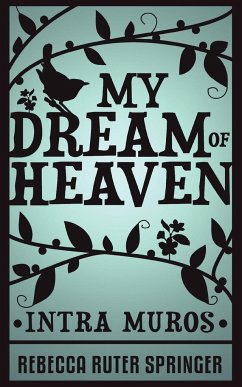Rebecca Ruter Springer was 29 when the American Civil War started in 1861. When the war ended five years later, 620,000 soldiers and countless civilians lay dead. It is not surprising, therefore, that the dead and heaven were much considered over the next forty years in the USA. And it was this spiritual climate that created Springer's classic, 'Intra Muros', or as it is now generally known, 'My dream of heaven.'Rebecca was born in 1832, in Indianapolis, Indiana; the daughter of a Methodist clergyman; she graduated from the Wesleyan Female College in 1850, and Methodist Christianity remained her spiritual home. In 1859, two years before the Civil War, she married William Springer, who went on to become a lawyer, and member of the Illinois General Assembly. They had one son, also called William, but Rebecca's health was never good, and described by one person as 'feeble'. In 1868, the couple went on a two-year European tour to improve her health, but it remained poor until her death. It was amidst ill health that her classic work was born. Intra Muros (Between the walls) or My Dream of heaven was written in 1898. It was a vision given to her during severe illness; and she was unconscious for some days as she received the vision - which in the telling, covers a period of years. On reflection, she came to understand the short book as a series of basic truths about heaven, offering readers both confidence that God had prepared a place for them; and that awaiting them there was a wonderful reunion with loved ones who had gone before. Springer did not bestow the status of 'prophecy' on her work; but rather intended it as comfort. As she said, she wrote the book with 'the hope that it may comfort and uplift some who read, even as it did, and as its memory will ever do, for me. I submit the imperfect sketch of a most perfect vision.'
Hinweis: Dieser Artikel kann nur an eine deutsche Lieferadresse ausgeliefert werden.
Hinweis: Dieser Artikel kann nur an eine deutsche Lieferadresse ausgeliefert werden.








